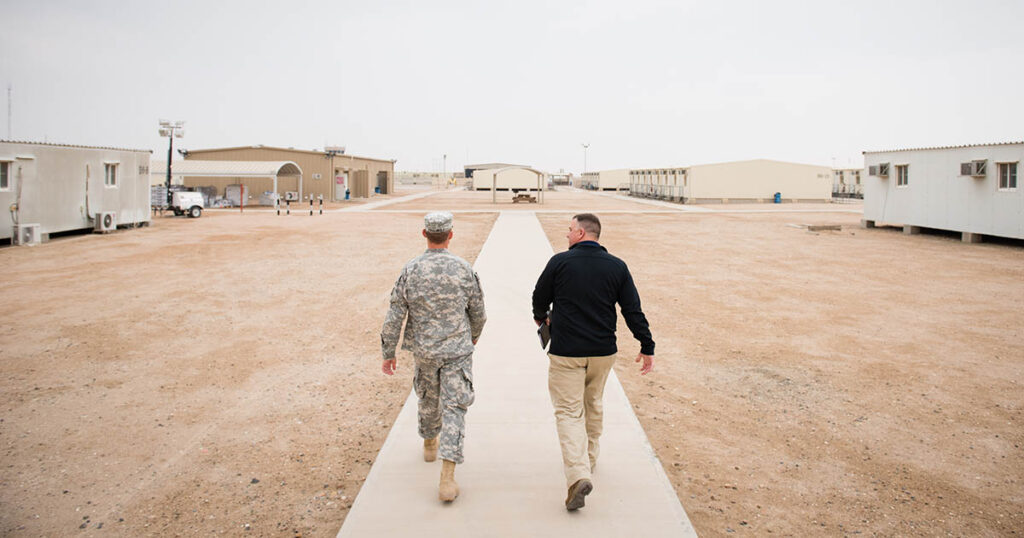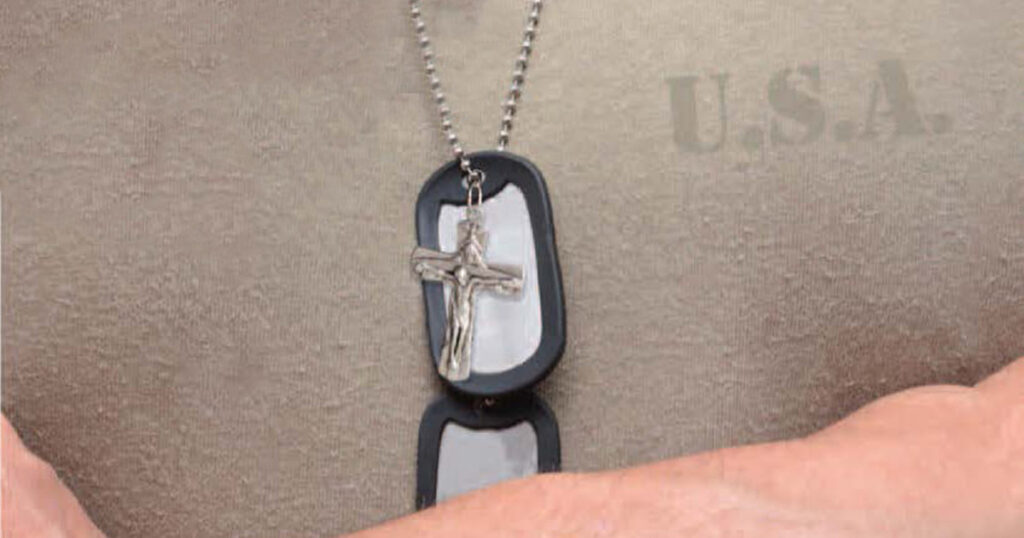They say something always breaks in the first week of a spouse’s deployment. Maybe this is a gift in disguise — a chance for a military wife to remind herself that she can, indeed, handle life’s curveballs on her own.
It doesn’t feel like a gift.
Last time, our coffee maker broke less than 24 hours after Ken left for an eight-month cruise. This time, the car battery sputtered out in a nearly-empty church parking lot at the end of a long Sunday morning. Thankfully, our dear pastor carries jumper cables.
(Note to pastors everywhere: Always carry jumper cables).
Soon after, I found myself trudging around Walmart in my church shoes, all four kids in tow, waiting for the auto center to install a new battery in our old van. My feet were killing me, but inside, I was numb from head to toe, still in shock from yet another tear-soaked goodbye to the love of my life. I’ve rarely felt so desolate.
A strange kind of poverty
Military families like mine don’t fit most people’s definition of “poor and needy.” We tend to be a little younger and in better health than the average American churchgoer. We can expect a steady paycheck, a full range of government benefits — from health care to housing to money for education — and a robust array of other resources besides.
But when a service member deploys for months or even years on end, leaving his or her spouse and children to endure a long separation and fend for themselves, these otherwise strong, well-resourced families often discover just how badly they need the love and care that can only come from the Body of Christ. And the Body of Christ, in turn, finds out how much their love and care can help a family in need.
A hard, lonely season
When my husband joined the Navy Chaplain Corps two years ago, we knew deployments were on the table. Nowadays, nearly everyone in the U.S. military experiences deployment at regular intervals. There are no free passes or “get-out-of-deployment-free” cards.
I didn’t think it would be a big deal. Our marriage is strong. We’re both mature, resourceful, relatively resilient individuals. Our kids are old enough to understand what’s going on — to read and send letters and emails; to know that their dad loves them always and will be coming back as soon as he can.
Even so, I was totally unprepared for how grueling deployment can actually be.
For him, deployment means hard, stressful work, long hours, austere living, some danger (but we don’t like to think about that) and little-to-no contact with the people he loves most. For me, it means hard, stressful work, extra worry and little-to-no contact with the person I love most. I cannot think of any other time in my life when I’ve ever felt so lonely and so anxious for so long. Yet somehow, by the grace of God, I get up and go on, day after day, putting on a brave face for the children and hoping desperately that nothing (else) will break and that no one will fall to pieces before he gets back.
“It’s a struggle making it to the end of the day during deployments.” – military spouse
“I just remember feeling so clueless, disconnected, alone … The people who seemed like they wanted to help couldn’t, and the people who could didn’t.” – military spouse
“It’s HARD. Even if a woman looks like she’s handling it well, there’s always tears and struggles. Military wives are good at holding it all together … but that doesn’t mean it’s easy.” – military spouse
“The hardest part of deployment was finding spiritual support as a Lutheran woman. I went through a very rough patch and went to a chaplain (Baptist, maybe) and was told that I was struggling because I didn’t have enough faith. It almost broke me.” – military service member
A flood of voices
I’m not alone in recognizing these challenges. As I pondered this article, I asked a series of questions in the Facebook discussion group for The Lutheran Ladies’ Loungepodcast I cohost for KFUO Radio:
Calling all Lutheran lady service members and military spouses!
- What do you wish your church family knew about the deployment experience?
- What are the biggest challenges you have faced during a long deployment?
- What have churches or individuals done for you in the past that really helped you get through?
- What would you love to see happen in the future either for your own family or for other military families going through a deployment?
I expected a handful of comments in reply. I didn’t expect the flood of discussion that quickly poured out. After the first 150 comments, I knew that my questions had touched a nerve. The Lutheran military community — and their friends and family members — had come out in force, inundating the thread with candid, insight-packed answers that eventually came to 17 pages of text, single-spaced.
Some women had been blown away by the love shown to them by their brothers and sisters in Christ during a difficult chapter in their lives; others had nearly been driven away by the lack of care or interest their churches had shown when they or their husbands had deployed. All, however, had noticed and remembered how their churches had supported (or not supported) them in both spiritual and practical ways during the long, hard season of deployment.
It is their words that you’ll see scattered at intervals throughout this article. It is their words, even more than my own, that I hope you will take to heart as you read.
What can you do?
It can be hard to help military families. We’re a proud, stubborn, self-reliant bunch. There’s a strong cultural tendency to stiffen our upper lip when things get rough, and an equally strong taboo against complaining about things we can’t change. While we often need and always appreciate help, it can be hard to ask for it — hard even to accept any but the firmest offers of assistance.
“Not only is [deployment] sensitive to discuss (OPSEC [operational security] and such), but it’s difficult to ask or even put into words what we need, unfortunately. We’re just kind of taught to be strong and dig deep.” – military spouse
“Many spouses will never reach out when things are tough, because they don’t want to be a burden.” – military spouse
“Here’s the secret: sometimes the help needs to be aggressive. Sometimes the best help is the help you don’t have to ask for.” – military spouse
Despite this reality, there are many things — large and small — that churches can do to support military families during deployment. Here are just a few.
1. Don’t wait until deployment to connect with military families.
Begin building relationships with them as soon as they show up at your church. Let them know about church activities they can take part in. Invite them home for a meal. Get to know their kids. Find out where they’re from and how they came to be where they are now. (I guarantee you’ll find the story interesting.) Become a surrogate family to them from the outset.
“[My church] was amazing in walking with me through our first deployment. They didn’t treat me like a military spouse who would only be with them a short time, but treated me like family from day 1.” – military spouse
“We have also been so touched when pseudo ‘grandparents’ have stepped into our daughters’ lives. … As a military family, we like to plug in RIGHT AWAY and are thankful for being included in Bible studies, asked to teach Sunday school, etc.” – military spouse
“The real heart of supporting military spouses begins long before a deployment; it is in establishing strong connections as soon as a military family moves into the congregation. Sometimes we were treated like second-class congregants because people assumed we wouldn’t be there long enough to make it worth their while to get to know.” – military spouse
“Don’t wait until deployment. Include me from day one. Ask me to come to Bible study; ask us to stay for fellowship; ask us to be a part of your family/congregation, especially when my husband is here; then when he is deployed, we already know each other. Include me, even if I am only in town for a few years.” – military spouse
2. Honor their service and acknowledge their sacrifice.
The first few times someone came up to my husband in uniform and told him, “Thank you for your service,” I felt a little awkward. How does one even respond to that? “Umm … you’re welcome”?
Now, though, I truly cherish the moments when folks acknowledge the selfless service he has rendered for his country. And when someone thanks me for my sacrifice (and it is, indeed, a sacrifice), I now respond just the way Ken does: “It’s an honor.”
“It really does mean something when people say, ‘Thank you for your service.’ Or ‘I’m praying for your husband.’ Keep saying it. And keep praying.” – military spouse
3. Don’t ask what they can’t tell.
Being thanked for my sacrifice no longer makes me cringe, but being asked probing questions about my deployed husband’s whereabouts definitely does. Basic Operational Security (OPSEC) requires that I not know much about where he is or what he’s doing while deployed — and what little I do know, I’m not allowed to tell. The old saying “loose lips sink ships” still applies.
In my heart, I know that all the people who unwittingly ask sensitive questions about his deployment — When did he leave? What ship is he on? Where is he now? What are they doing? When is he coming back? — aren’t enemy spies plotting sabotage. They’re just kind, caring people making polite conversation. Unfortunately, that makes it even harder to say (as I always must), “I really wish I could tell you, but I can’t.”
Questions that don’t imperil OPSEC, however — Have you heard from them lately? Is everything OK? How are you doing? How can I pray for you? — are always appreciated.
“It’s thoughtful to ask how the service member is doing while they’re gone, but the truth is we can’t give a vulnerable response to that question.” – military spouse
4. Pray, pray, pray.
Pray as a church. Add a regular petition in the corporate prayers for deployed service members, and pray for them by name as a congregation every Sunday until you see them in the pews again. Our church makes a practice of including deployed service members on its prayer list, and it encourages me every week.
Pray on your own. Whether service members and their families know you’re praying for them or not, they desire and need your prayers. Deployment can strain relationships and stretch faith to the breaking point; without God’s hand to guard and protect, the spiritual and emotional fallout can be devastating.
“I appreciated that our pastor included him in prayer during church every single week. And us too. He never forgot. Honestly, he still hasn’t.” – military spouse
“The #1 thing is prayer. Ask congregational members to adopt a deployed family or service member specifically to pray for her/him/them.” – military spouse
5. Send letters and care packages.
Ask the spouse at home for an FPO address you can use to send the deployed service member letters and care packages. Whether you’re a friend or a stranger, it is encouraging to hear from a fellow believer. Include notes and resources to strengthen their faith, along with a few nonperishable goodies to cheer their heart. (For a list of suggested care package items, see below.)
“A handwritten note or prayer, a devotional, even just an interesting story goes a long way. Homemade goodies that won’t spoil in transit are always welcome.” – military spouse
“The thing I can think of for my husband is maybe some devotions or Bible verses about not being alone. He feels very isolated out there, especially since most of his fellow soldiers are non-believers.” – military spouse
“[When I was deployed] I would have liked to have gotten mail. Any mail. It was rough.” – military service member
6. Get to know the individual needs of the family left behind.
Some spouses and families turn inward and like to be left alone during deployment. Others shrivel up from loneliness and the lack of daily adult interaction. Some feel confident and competent to handle the challenges that arise without outside assistance. Others feel completely helpless and overwhelmed at the outset of every new crisis.
Talk to the military spouse early on in the deployment and ask them about the particular challenges they are facing and what kind of help would be the most welcome.
“It’s ok to ASK what a mom needs, because not everyone is going to have the same needs.” – military spouse
7. Offer (or just show up) to help in concrete ways.
While each family’s needs are unique, some kinds of help are almost universally welcomed with gratitude.
a. Childcare. Solo parenting for months at a time without a break can be tough. Offer to sit with the kids for a couple hours a week so Mom or Dad can run errands, get some exercise or just sit in a coffee shop and read for a while. On Sunday mornings, offer to sit with a frazzled parent during church and help with their young ones.
“What would have made things easier for me … would have been for someone to take my kids for a few hours each week so I could run errands and get other things done.” – former military spouse
“Help with kids during the service! I can’t tell you how many times I missed the sermon or communion.” – military spouse
b. Adult companionship and encouragement. Deployment is lonely. As the parent of older children, I sometimes go days without conversing meaningfully with anyone over 16. I’m blessed to have teenagers, though. For childless spouses or parents of young children, the loneliness can be even more intense. Invite spouses over for coffee and conversation, call them up to check in and see how things are, or send an encouragement card or gift “just because.”
“Checking in and inclusion is a big key. Deployments can be a very isolating time for a spouse, especially those that aren’t near friends and family and those who don’t live on base and may lack support. A simple cup of coffee, an offer of a grocery run or a shoveled driveway can mean the world to someone who I guarantee is struggling with worry.” – former military spouse
“The things I needed the most were an extra set of hands and companionship. … More than anything, I needed friends to make up for my husband being gone. Adult conversation to distract you from being alone.” – military spouse
“I need someone to spend time with us … to talk to, face to face. As much as I love my kiddos, it’s nice to have an adult presence to look forward to.” – military spouse
“I had someone show up unexpectedly during my husband’s last deployment with dinner, and it brought me to tears because it was a really terrible week and so appreciated.” – military spouse
c. Handy help. Deployment often takes the family handyman away from home, making even small repairs stressful and time-consuming to deal with. Offer to help with home maintenance, car repairs, yard work and the like, and you’ll remove a heavy burden from a frazzled spouse’s shoulders.
“During deployment we often joke about Murphy’s Law … if it can go wrong, it often does. Giving spouses a list with phone numbers of congregants who are skilled at odd jobs or willing to be a Mr./Mrs. Fix It [would be a great gift], so we know who to call when the washing machine overflows, the toilet tank cracks, the dishwasher leaks, something pokes a hole in the drywall, the car gets a flat or the hot water heater goes on the fritz.” – military spouse
d. Emergency backup. Military families are rarely stationed close to their “people.” Parents, siblings, old friends — are all out of reach when the time comes to fill out an emergency contact form or rush a sick child to the hospital in the middle of the night. Offer to be someone’s “person” during deployment, and then be willing and ready to serve at a moment’s notice.
“And ER visits — besides everything else, military spouses have it in the back of their minds, ‘What do I do with the other children if I need to take one to urgent care or the ER (in the middle of the night!!!)?’” – military spouse
8. Check in regularly (even if they aren’t around).
Deployments are long. Everything in this article applies as much on day 200 as it does on day one, perhaps even more so, as fatigue sets in and takes over. If you have taken up the challenge to offer Christian help and encouragement to a military family during deployment, be ready to keep at it for the duration.
This holds true even if that family disappears for a time. It is not uncommon for spouses and children, overwhelmed by the stress and loneliness, to pack up and temporarily relocate to be closer to their extended family and friends during part or all of a deployment. Last spring, my kids and I left for three months. Our pastor reached out several times by email to check in while we were gone — bless him — and welcomed us warmly back when we returned, just as if we’d never been away. I won’t forget that.
“During that time, members of our congregation offered to watch my kids, pick up groceries, bring dinner, and generally be on-call for anything that I needed. I know that I was in their prayers as well; my women’s Bible study group was very intentional about praying for us. One or two families in our church, in particular, made sure to text me regularly to check in. I even asked one of the women I’m closest with at church to have a key to our place during my husband’s time away. We don’t have any family nearby, so this willingness to help and all the love and support of our small congregation was invaluable to us.” – military spouse
9. Be there for them even after the deployment ends.
One of the most challenging times for military families comes not during deployment but after. Once the teary-eyed reunions are over and the giant “Welcome Home!” banners are put away, the hard work of reintegration begins. Be prepared to offer prayer and support during this season as well.
“I wish there were more support after service members return home. … The adjustment can wreak havoc on families.” – military spouse
“Don’t just assume that everything is rainbows and puppies once the service member returns home. There is a LOT of hard work required to reintegrate the service member back into family life.” – military spouse
“My husband and I have sat down with our pastor — both together, alone or with one of the kids as needed when we couldn’t quite get on the same page. Reintegration even into your own nuclear family unit is hard.” – military spouse
‘In their affliction’
In James 1:27, the apostle tells us, “Religion that is pure and undefiled before God the Father is this: to visit orphans and widows in their affliction, and to keep oneself unstained from the world” (emphasis added).
While military deployments do not leave families “widowed and orphaned” forever, they do create long, lonely windows of time in which service members and their spouses and children need special help and encouragement from their church communities.
Deployment can make, shake or even break a military family’s faith. As their brothers and sisters in Christ, we can actively seek out ways to strengthen the bonds of love and faith during these challenging seasons of separation.
Dos and don’ts for military care packages
Do send:
- Personal notes of encouragement
- Devotional materials
- Jerky, nuts and sausage sticks
- Water additives or flavor packets
- Individually wrapped candies
- Individual cocoa, tea or coffee packets
- Prepaid phone cards
- Washcloths, toothpaste and other personal hygiene products
- Lip balm and unscented lotion
- Breath mints and chewing gum
- Small handmade tokens of appreciation
- Stamps and notecards they can use to write home
Don’t send:
- Anything perishable (anticipate a shipping time of 4–6 weeks)
- Anything that could melt, crumble, burst or explode en route
- Socks, underwear or other attire
- Tobacco products or alcohol
Learn more about Operation Barnabas, an LCMS initiative that empowers churches and individuals to encourage military service members in their faith.
Photo: LCMS Communications/Erik M. Lunsford





